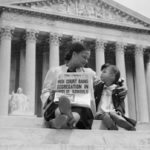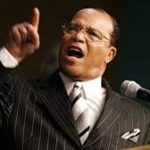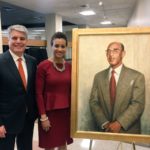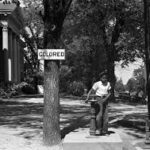The New Color Line at the University of Texas

An edited version of this appeared in Minding the Campus on September 20, 2018. Thanks to Instapundit for the attention (here and here).
State-sponsored race discrimination is offensive and immoral. Our national ideals, set forth in the Declaration of Independence, flow from the self-evident truth that all men are created equal, endowed by their Creator with certain unalienable rights. The ideal of equality before the law, finally vindicated by a bloody Civil War and the ratification of the Thirteenth and Fourteenth Amendments 150 years ago, led ineluctably to a constitutional mandate for colorblindness. The landmark Supreme Court decision in Brown v. Board of Education (1954) banned, once and for all, the differential treatment of citizens by governmental actors on the basis of race. Our society recognizes no castes—favored or disfavored—due to skin color or ethnicity.
Or do we? Higher education, integrated even in the Jim Crow south with the support of federal troops in 1963, is returning to racial separation. Some colleges have separate dorms—designated “safe spaces”—for black students. At the University of Texas–which the Supreme Court forced to desegregate in 1950, prior to Brown—colorblindness is being replaced with racial division. The mind-bending irony is that this return to the odious color line is being led by African-American students and academics, in the name of diversity! George Wallace, who famously stood in the doorway of the University of Alabama, blocking the entry of black students, would be amused at the spectacle of black students clamoring to segregate themselves.

In the interest of promoting solidarity, UT offers black students a separate lounge area on campus in which to congregate, study, and socialize. The lounge, which serves as a hub for UT’s black community, is, appropriately, named after black separatist Malcolm X. UT’s Multicultural Engagement Center, a student resource office within the Division of Diversity and Community Engagement, hosts a number of black-only events, including a separate graduation ceremony (dubbed Black Graduation), described as “an annual program that gives graduates the chance to commemorate and cherish all the accomplishments, memories, and challenges throughout their college years. Furthermore, it is an occasion for parents and families of graduates to meet with Black faculty and staff to gain a greater insight on the journey of their students.”

The MEC was founded in 1988 in response to the anti-apartheid movement at UT. To protest South Africa’s discriminatory racial policies, black students at UT incongruously insisted on their own center to “centralize academic, social and financial information for African American and Hispanic students.” MEC’s Afrikan American Affairs program sponsors other black-only events, such as a Senior Brunch, a New Black Student Weekend, and a Black Block Party. The MEC also conducts “culturally relevant campus tours and student panels,” which means tours and panels geared toward black, Latino, and Native American students. Promoting diversity, it turns out, requires treating students differently on the basis of race and ethnicity: “The MEC continues to serve as a resource for students of color at The University of Texas at Austin as well as empowers them to be the agents of social change.”

Civil rights leaders once dreamed of a day when Americans would be judged by the content of their character, not the color of their skin, but today a different message is being spread at UT and other college campuses. “Diversity” means singling out certain races for special treatment—the opposite of equality. UT’s extensive diversity bureaucracy effectively creates a separate education experience for “students of color,” with programs like the African American Male Research Initiative, the Black Student Leadership Institute, the Black Male Education Research Collection, the John L. Warfield Center for African and African American Studies, and the African & African Diaspora Studies Department. UT even has a taxpayer-funded research center, the innocuously-named Institute for Urban Policy Research & Analysis (IUPRA), that is focused on “social issues affecting Black communities in Texas.” Led by Kevin Cokley, IUPRA is listed as a branch of the Black Studies program at UT.

IUPRA describes its analytic approach as “a racial equity framework,” but in reality it promotes critical race theory, a highly-controversial post-modern movement premised on the existence of institutional racism, the systemic marginalization of people of color, and power structures within society based on white supremacy that oppress racial minorities. “White privilege” is a familiar CRT slogan. Edmund T. Gordon, founding chair of UT’s African and African Diaspora Studies Department and UT’s newly-appointed Vice Provost for Diversity, is a proponent of this radical ideology. Gordon risibly believes that the iconic UT fight song, “The Eyes of Texas,” is racist, and has argued that race-neutral college admissions at UT would perpetuate America’s legacy of racism and “white supremacist ideologies.”

Accordingly, the research and publications of the IUPRA more closely resemble tendentious, racially-tinged polemics than academic scholarship. IUPRA’s signature initiative, titled “The State of Black Lives in Texas,” is focused on “racial disparities affecting the Black population in Texas.” One of the components of the initiative is a discussion series called Black Policy and Tea Events. IUPRA professes to be a “nonpartisan organization,” but its progressive staffing and single-minded focus on race yield the typical “social justice” policy agenda. Texas taxpayers are forced to subsidize a stream of op-eds written by IUPRA staffers attacking President Trump and the state’s Republican elected officials, and advocating unconstitutional restrictions of so-called “hate speech.”

No matter what the issue—housing, education, health, criminal justice, the discipline of disruptive students in public school, economic inequality—IUPRA’s research invariably concludes that the “problem” is the same: institutional racism. And IUPRA’s “solutions” are equally predictable: racial quotas to ensure equal outcomes in all areas of life. Of course, quotas cannot be maintained without the government constantly counting on the basis of race and intervening to “correct” results that do not match the desired ethnic and racial mix. The propagation of race consciousness—the antithesis of our national motto, E pluribus unum—is a central tenet of identity politics.
All this race-based social engineering is sadly reminiscent of the pre-Brown era of “separate but equal.” One IUPRA associate conceded that this is the goal, urging “Let the lofty ideal of integration go,” in favor of “elective separation.” Brown was a failed “experiment,” many CRT proponents believe, because integration has doomed black students to “white supremacist and anti-black educational systems and structures.” We must reject such poisonous rhetoric because it exhibits the extremism of Louis Farrakhan and his Nation of Islam, not the healing, color-blind rhetoric of Martin Luther King, Jr. and Frederick Douglass. Promoting a race-centric college experience, and inculcating a racial worldview divided between white oppressors and black victims, is an indefensible betrayal of Brown and a corruption of higher education.

In the lobby of UT’s law school hangs a portrait of Heman Sweatt, the African-American plaintiff who broke the color barrier at UT in 1950 by forcing the school to admit blacks. The portrait represents UT’s contrition for a legacy of discrimination that ended nearly 70 years ago. At the unveiling ceremony for the portrait, UT President Greg Fenves movingly recounted that Sweatt “challenged the greatest injustice in the history of UT, and pushed this university to truly become a university of the first-class, for all Texans.” How tragic—and profoundly misguided—that, in the name of “diversity,” leftist academics repudiate the ideal of equality and urge a return to the color line.


Postscript: The UT alumni organization, Texas Exes, has a segregated group for blacks called the Black Alumni Network. (Just imagine the outrage if white alumni organized a comparable group.) The Black Alumni Network has, with UT’s support, begun to hold an annual Black Homecoming event. In 2016, UT President Greg Fenves helped to launch the UT Black Alumni Homecoming Weekend. Consider the irony: To celebrate integration, UT encourages black alumni to practice segregation. In Brown v. Board of Education, the Supreme Court held that “We conclude that, in the field of public education, the doctrine of ‘separate but equal’ has no place. Separate educational facilities are inherently unequal. Therefore, we hold that the plaintiffs and others similarly situated for whom the actions have been brought are, by reason of the segregation complained of, deprived of the equal protection of the laws guaranteed by the Fourteenth Amendment.” If “separate is inherently unequal,” why does UT countenance racial separatism by black students and alumni? To commemorate the integration of UT, the University sponsors a Black Alumni Homecoming Weekend? That incoherence is what “diversity” has come to mean. The UT School of Law is a bit more subtle, calling its annual reunion event for alumni of color “diversity weekend.”































